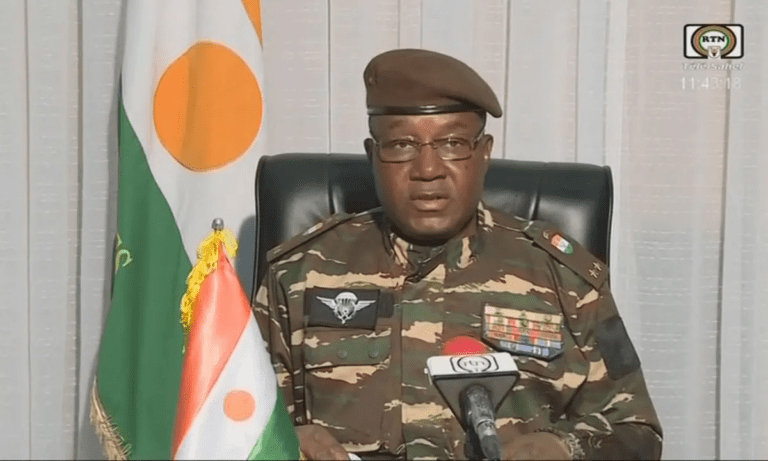APA-Bamako (Mali) Niger’s head of state asked for the support of his Malian counterpart.
Leading a large delegation comprising members of the transition government and other senior figures, General Abdourahamane Tiani paid his first foreign visit to Mali on Thursday November 23, since taking power on July 26 following a putsch against Mohamed Bazoum.
After a closed-door exchange with Mali’s Transition President at the Koulouba Palace, the meeting was extended to include members of both countries’ delegations. On the agenda was the strengthening of collaboration around the Alliance of Sahel States (AES), an organization made up of Mali, Burkina Faso and Niger. An organization created, according to Niger’s strongman, to “combat terrorism and organized crime.”
He also pledged that the three countries “will not falter” thanks to the support of their peoples. In his view, the latter, through the ESA, “have realized that nothing will deter them from making the Sahel not a zone of insecurity, but one of prosperity.”
General Tiani was quick to congratulate the Malian authorities on the recapture of Kidal on November 14, after a decade’s absence of the Army. According to him, this is “an opportunity to begin the pacification of the Sahel in general.”
The embargo imposed by the Economic Community of West African States (ECOWAS) was also on the agenda. Despite Mali and Burkina Faso’s disagreement with these measures, General Tiani said he was “open to dialogue” with the West African organization. He declared that “we will once again seek the support of Mali, Burkina and others to ensure that this embargo is lifted.” At the same time, he called on West African leaders to be “sincere, motivated by goodwill and concern for the African people.”
His whirlwind visit to Bamako coincides with that of Burkina Faso’s Prime Minister, Apollinaire Joachimson Kyelem de Tambela, who arrived the day before.
The operationalization of AES in question
The meeting provided an opportunity for expert delegations from the three countries to examine the operationalization of the ESA’s economic, cultural, political and social bodies.
The general aim of the meeting is to “exchange views and create synergies of action between member countries on accelerating the process of economic and financial integration within the Alliance”. In other words, it will assess the strengths, weaknesses, opportunities and threats facing the Alliance. The results of this meeting will be submitted to the Alliance’s Conference of Finance Ministers, who will validate them at their meeting scheduled for tomorrow, Saturday November 25. This will be followed by a meeting of the foreign ministers of the three countries on November 30.
This meeting between diplomats is intended “to decide on the additional protocols to be adopted, the bodies to be set up and the political and diplomatic coordination measures to be defined on the basis of the recommendations of the Senior Officials meeting on November 27 and 28.” These meetings are intended to identify ways and means of operationalizing the AES.
MD/ac/fss/abj/APA


